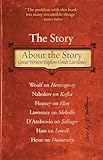
 The debate between writers and critics over authorial intent is literally a life and death struggle. By literally, I mean figuratively. On the one hand, you have critics who have trumpeted “the death of the author” for several decades now, the view that holds that authors can’t be the true masters of their creations, can’t fully grasp the implications of language they pluck, seemingly, from a great assembly line of words and idioms. On the other hand, you have writers like those anthologized in The Story About the Story and The Story About the Story II, who argue, more often than not, that to read is to feel your mind, however fleetingly and incompletely, jacked into the mind of another, a connection that is perhaps more alive than even our relations with those we consider intimates.
The debate between writers and critics over authorial intent is literally a life and death struggle. By literally, I mean figuratively. On the one hand, you have critics who have trumpeted “the death of the author” for several decades now, the view that holds that authors can’t be the true masters of their creations, can’t fully grasp the implications of language they pluck, seemingly, from a great assembly line of words and idioms. On the other hand, you have writers like those anthologized in The Story About the Story and The Story About the Story II, who argue, more often than not, that to read is to feel your mind, however fleetingly and incompletely, jacked into the mind of another, a connection that is perhaps more alive than even our relations with those we consider intimates.
The debate is preposterous on its surface. Of course the publishing industry, with its book packaging scandals and its ridiculous pseudonym play (I once met a man, an ex-convict, who claimed to have profited three-quarters of a million dollars ghostwriting a series of Little House books for a descendant of Laura Ingalls Wilder), undermines the sense that reading is interaction with another discrete life. But anomalies don’t founder what is intuitively true. When I read, I read for what I think an author wants to be expressing. In this, I’m not alone. Many years ago, Henry James complained – a plaintive cry, really – that critics of his own time were “apt to stand off from the [artist’s] intended sense of things.”
Where does this impulse come from? There are many sources, of course: the new critics and the intentional fallacy, and T.S. Eliot would probably be in this camp, and maybe the surrealists, and perhaps someone like Mallarmé. I don’t claim to be a scholar of all that, and anyway “the death of the author” traces most directly back to Roland Barthes’s 1967 essay, “The Death of the Author,” a short piece that, pound for pound, may be one of the most influential texts ever produced.
And what did Barthes intend? That’s not entirely clear. “The Death of the Author” begins with a quote from Balzac’s story “Sarrasine,” a musing passage that Barthes reads as neither a character’s free indirect speech, nor the author “acting directly on reality.” From this he declares both the death of the author and the “birth of the reader”: an active interpreter of writers who are no longer authors at all, in the old sense of the word. Proust is Barthes’s best example of this new writer, the “scriptor” whose character is a depiction “of he who is going to write.” This “enunciation is an empty process,” and scriptors merely supply a “tissue of quotations.” “I is nothing other than the instance of saying I,” Barthes writes. It’s only in the mind of the new reader that words and images come to mean anything at all.
The old position of the author, Barthes claims, mistakenly demanded that we think of books as written in code. Hear, hear. Other than that, all Barthes really seems to mean is that reading has become a cooperation of imaginations. What he doesn’t recognize – couldn’t have recognized – is that the same electric jolt that he had used to execute the author would shock to life a correspondingly monstrous critic.
To back up a bit. What’s meant by the “literary canon”? Literally, a canon is any authoritative set of standards, but figuratively the literary canon most closely resembles the processes of Biblical canonization, by which Christian sects debated and decided which ancient scriptures were of divine origin, inspired. In other words, a bunch of folks got together to look at work they knew was written by a person, and they simply decided that whoever wrote it no longer mattered, because God wrote it. Those writers might as well be dead – and that’s sort of what became of Barthes’s essay. Literature is a secular revelation of a more earthly god, human consciousness, and all that was needed was a critic/theologian to interpret it for laypeople, for mere “readers” who would be less encouraged to read for themselves than compelled to listen to interpretations. That pretty much describes both the modern Ph.D. in English and the practice of teaching literature to children as a compulsory subject in the public education system.
But the demotion of writers to figures stumbling blindly through the collective unconscious falls to the same arguments that toppled B.F. Skinner’s, and behaviorism’s, simplistic claim that consciousness doesn’t exist (See Chomsky, Koestler, Carl Rogers, and others). More simply, Samuel Butler once refuted this same species of skepticism – the claim that matter itself was hypothetical – by pounding his foot on a stone and proclaiming “I refute it thus!” To the literary obstetrician Barthes attempting to midwife a new reader, one might feel compelled to proclaim, “It has always been thus!”
 Because he wasn’t saying anything new. And I don’t mean new critics or Mallarmé For at least a couple hundred years, writers have understood that their work wouldn’t amount to much without the reader’s imagination percolating away on the other side of the page. It was there in 1837, in “The American Scholar,” when Emerson coined the phrase “creative reading” in the same sentence that gave us “creative writing.” It was there six decades later, when Henry James described The Turn of the Screw as a “process of adumbration,” a sketch the reader colors in with “his own experience, his own imagination, his own sympathy.” And it was there a couple decades after that, in Barthes’s beloved Proust’s “On Reading”:
Because he wasn’t saying anything new. And I don’t mean new critics or Mallarmé For at least a couple hundred years, writers have understood that their work wouldn’t amount to much without the reader’s imagination percolating away on the other side of the page. It was there in 1837, in “The American Scholar,” when Emerson coined the phrase “creative reading” in the same sentence that gave us “creative writing.” It was there six decades later, when Henry James described The Turn of the Screw as a “process of adumbration,” a sketch the reader colors in with “his own experience, his own imagination, his own sympathy.” And it was there a couple decades after that, in Barthes’s beloved Proust’s “On Reading”:
And there, indeed, is one of the great and marvelous characters of beautiful books (and one which will make us understand the role, at once essential and limited, that reading can play in our spiritual life) which for the author could be called “Conclusions” and for the reader “Incitements.” We feel quite truly that our wisdom begins where that of the author ends, and we would like to have him give us answers, while all he can do is give us desires. And these desires he can arouse in us only by making us contemplate the supreme beauty which the last effort of his art has permitted him to reach. But by a singular and, moreover, providential law of mental optics (a law which perhaps signifies that we can receive the truth from nobody, and that we must create it ourselves), that which is the end of their wisdom appears to us as but the beginning of ours, so that it is at the moment they have told us all they could tell us, that they create in us the feeling that they have told us nothing yet.
 To be fair, Barthes had his regrets. Ten years after “The Death of the Author,” and shortly before he died, he kicked back at his own, “I is nothing other than the instance of saying I.” In its first pages, A Lover’s Discourse insists that “To that discourse has been restored its fundamental person, the I.”
To be fair, Barthes had his regrets. Ten years after “The Death of the Author,” and shortly before he died, he kicked back at his own, “I is nothing other than the instance of saying I.” In its first pages, A Lover’s Discourse insists that “To that discourse has been restored its fundamental person, the I.”
So how does the struggle end? Perhaps with simple statements, rather than melodramatic metaphors. Critics who have taken up the dead author standard would have us regard creative work as an elaborate Freudian slip: don’t read for what a writer is trying to say, read for what they’ve said in spite of themselves. That’s wrong. Literature (and all the arts, really) is the product of concentrated, intelligent minds to which we are granted intimate, but temporary and incomplete, access. We should embrace and not denounce that opportunity to comingle thought. Art is not an accident.








